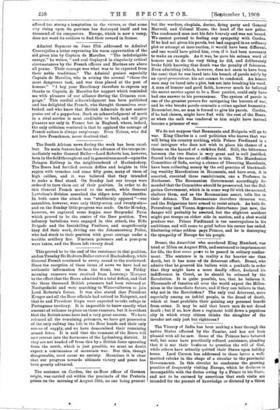The sentence on Cordua, the ex-Boer officer of German origin,
was carried out within the precincts of the Pretoria prison on the morning of August 24th, no one being present
but the warders, chaplain, doctor, firing party and General Maxwell, and Colonel Maxse, the head of the new police. The condemned man met his fate heave), and was not bound. We cannot pretend to feeling any sympathy with Cordua. If he had not given his parole, but bad engaged in an ordinary plot or attempt at insurrection, it would have been different, and one would have pitied him, even if it had been necessary to make an example. As it was, he gave his solemn word of honour not to do the very thing he did, and deliberately broke faith knowing that death was the penalty of falseness. Even admitting (which, however, does not seem to have been the case) that he was lured into his breach of parole solely by an agent-provocateur, his act cannot be condoned. An honest man may be lured into a plot, but not into breaking his word. A man of honour and good faibla, however much he believed the secret service agent to be a Boer patriot, could only have had one answer to his persuasions. The system of parole is one of the greatest powers for mitigating the horrors of war, and he who breaks parole commits a crime against humanity. Remember, too, no man is foroad to give his parole. Cordua, if he had chosen, might have fled with the rest of the Boers, or when the oath was tendered to him might have instead become a prisoner of war.


































 Previous page
Previous page